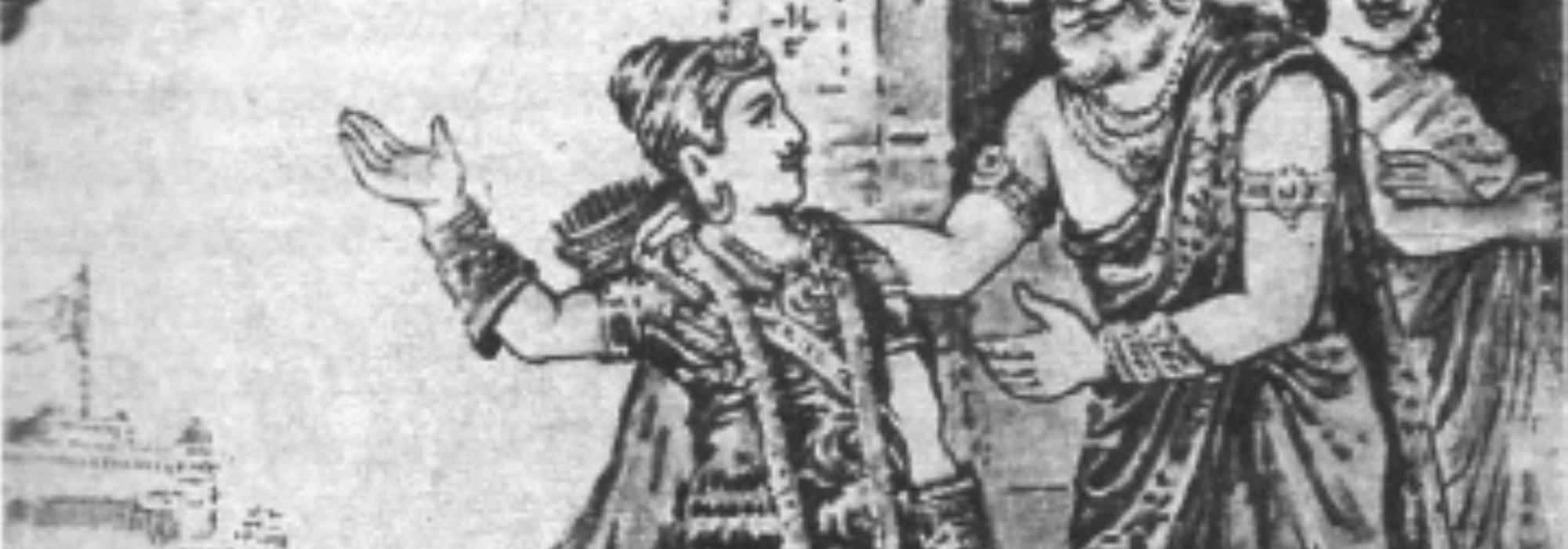Prince Uttara, adorned with garlands and fragrant perfumes, came in a procession on the royal path; he greeted the citizens of the city and the married woman, receiving their blessings and adoration. In great grandeur and filled with delight, he came to the door of the palace and brought the good news to his father. The doorkeeper-sentinels rushed inside and told King Virāṭa, “Mahārāja! Prince Uttarakumāra is standing at the doorway along with Bṛhannaḻā.” Upon hearing this, the king said, “Bring them both inside, quick; I am desirous of seeing them at once!” Yudhiṣṭhira whispered in the ears of the sentinel, “Bring only Uttarakumāra with you; don’t bring Bṛhannaḻā. He has taken the oath that if anyone inflicts a wound on me or makes me bleed, except on the battlefield, he will not let him live. If he sees blood on my person at this moment, he will get enraged and annihilate King Virāṭa and his entire family!” Accordingly, Uttara alone entered the palace, touched the feet of his father and took his blessings. Uttara then saw Dharmarāja, who was seated on the ground; he was awash with blood; Sairandhrī was standing beside him. Immediately, Uttara asked his father, “Mahārāja! Who is the person who has hit him? Who has done this heinous sin?” Virāṭa replied, “I hit him; he should have been punished more; instead of praising you, the brave warrior, he was singing praises of that bloody eunuch!” Uttara said, “Mahārāja! You have done a terrible thing; immediately seek his forgiveness by speaking pleasant words and make him smile again. The anger of a brāhmaṇa is a ghastly thing; it has the power of burning everything from its very root!” Accordingly, Virāṭa apologized to Dharmarāja, who said, “Mahārāja! I have forgiven you long back! I am not angry; if a single drop of my blood had fallen on the ground, you along with your entire kingdom would have been destroyed; even though I don’t desire to cause annihilation, it would have happened by itself.” After the bleeding had stopped, Bṛhannaḻā entered and bowed down to Virāṭa and Kaṅka. Virāṭa turned towards his son and within Arjuna’s earshot, spoke these words of praise: “My son! Because of you, I have become a father of a son; indeed a son like you was never born in the past and will never be born in the future. My son, how did you vanquish Karṇa, the great warrior who is capable of hitting thousands of randomly moving targets without ever missing? My son, how did you defeat the great Bhīṣma, unperturbed as the ocean but more unbearable than the fire of Time? My son, how did you face Droṇa, who is renowned as the ācārya of all kṣatriyas and is the unmatched expert in the art of warfare? My son, how did you ward off the great warriors Kṛpa and Aśvatthāma? My son, how did you conquer Duryodhana, who is capable of tearing apart even mountains by his arrows?” He was evidently pleased with his son. Uttara replied, “Neither did I retrieve our cattle nor did I defeat our enemies; all this was accomplished by the son of a deity. I was terrified of the enemy army and tried to run away from the battlefield but he dragged me back; as I drove the chariot, he sat like one endowed with diamond-like hands. It was he who defeated the Kauravas and retrieved our cattle. It was due to his arrows that Droṇa, Bhīṣma, and others went back. Duryodhana was on the verge of forsaking the battlefield out of fear when this great hero mocked him saying, ‘Kaurava! If you go to Hastināpura, you will not have much time left; if you try to escape, I won’t let you off so easily; therefore, come and fight; if you win, the kingdom is yours; if you lose, you will attain heaven!’ His chariot turned around; he returned, hissing like a serpent, and released shafts like lightning. Looking at that, I was aghast and my limbs trembled. That single warrior-hero vanquished the six chariot warriors just as a great tiger pounces upon poor grass-eating deer and overpowers them!” Virāṭa was shocked. “Where is that great hero, that son of a deity? I must meet that matchless warrior who protected my son and saved my cattle from the Kauravas; I must shower him with honour!” Uttara said, “He has disappeared; he will re-appear tomorrow or the day after!” Listening to all this, although Arjuna was sitting there, masquerading as Bṛhannaḻā, King Virāṭa could not recognize him at all.
After this, obtaining permission from Virata, Arjuna took with him all the clothes picked up from the battlefield and handed it over to Uttarā. Seeing those expensive and variegated pieces of cloth, many of which were made from fine gossamer and silk, Uttarā was overjoyed. After secret consultations with both Uttara and Yudhiṣṭhira, Arjuna joyfully planned the upcoming activities and decided how things should pan out.
To be continued…
This is an English translation of Prof. A R Krishna Shastri’s Kannada classic Vacanabhārata by Arjun Bharadwaj and Hari Ravikumar published in a serialized form. Thanks to Śatāvadhāni Dr. R Ganesh for his review and astute feedback.

















































